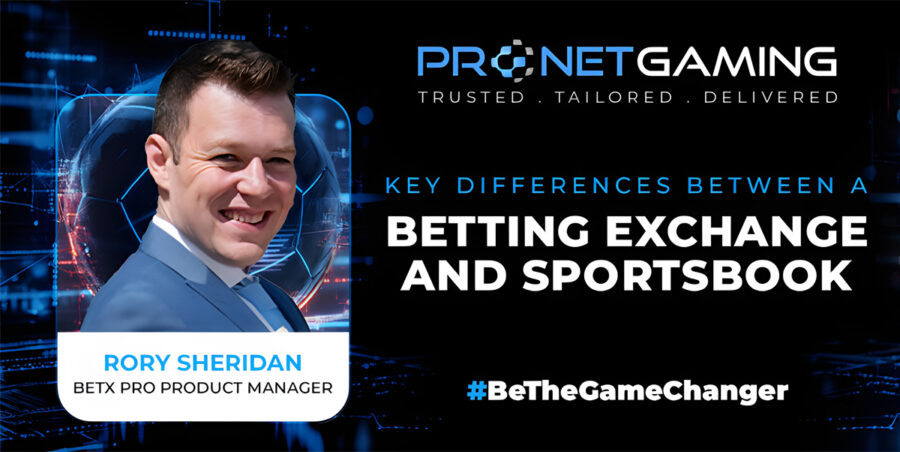Pronet Gaming unveils the key differences between a betting exchange and sportsbook

Rory Sheridan, Pronet Gaming BetX Pro Product Manager, discusses the key differences between betting exchanges and sportsbooks, highlighting the implications for both operators and players.
Opinion.- In the continually evolving landscape of online gaming, operators these days must navigate numerous betting options to cater to diverse player preferences. Among these, betting exchanges and traditional sportsbooks stand out as two prominent models.
In this article, Rory Sheridan, Pronet Gaming BetX Pro product manager, discusses the main differences between betting exchanges and sportsbooks, highlighting the implications for operators and players alike.
What is the main difference between a betting exchange and a sportsbook?
At its core, the primary difference between a betting exchange and a sportsbook lies in the structure of the betting system. A sportsbook is a platform that takes bets directly from players, setting the odds and offering a fixed payout. Operators assume the role of the bookmaker, determining how much can be wagered and how odds are calculated.
Conversely, a betting exchange is a peer-to-peer platform where users may place bets and match orders against multiple parties. In addition, bettors can bet against an outcome happening and trade sporting events by buying and selling positions on teams. In essence, it is a high volume, low margin commission model that offers better odds than a traditional sportsbook, resulting in a dynamic pricing environment.
Speaking of odds, how do the dynamics differ between the two?
In sportsbooks, odds are generally more stable and predictable, as they are set by the operator based on various factors, including team performance, historical data, and market sentiment. This fixed nature means that players are betting against the house, which can lead to lower payouts if the operator’s odds are conservative.
In contrast, betting exchanges offer variable odds that fluctuate based on demand. Players can influence these odds by placing their bets, which means the odds can change rapidly as more users engage with the platform. This creates a more engaging experience for users who enjoy the thrill of negotiating prices, similar to trading on a stock market. The potential for better odds is a significant draw for savvy bettors who are willing to shop around for the most favourable terms.
What other terms are often taken into consideration?
Fee structure—which is another major distinction between these two platforms. Sportsbooks typically operate by taking calculated risks while relying on margin to ensure profitability. This means players often face a built-in disadvantage, as the odds are adjusted to ensure the sportsbook maintains a profit margin.
Betting exchanges, on the other hand, operate on a commission basis for winning bets. When a user wins a bet, the exchange charges a small percentage of the profit. This model can be more appealing to users, as it allows for potentially higher returns on successful wagers.
How do the two platforms vary in terms of user engagement?
User experience varies significantly between betting exchanges and sportsbooks. Sportsbooks are typically designed to be straightforward, allowing users to place bets quickly on various events. They often feature promotions, bonuses, and loyalty programmes to retain players. However, this simplicity can sometimes lead to a less engaging experience for those who crave more interactivity.
In contrast, betting exchanges promote a more interactive environment. Users engage not only in betting but also in market dynamics, as they can see how other users are betting and adjust their strategies accordingly. They get to enjoy the flexibility that trading offers, from actively buying/selling positions, trading the markets, requesting desired odds, and more. For online gaming operators, offering a betting exchange can attract a demographic of players who thrive on strategic thinking and market participation.
From an operator’s perspective, what risk management factors are considered?
Sportsbooks face challenges in balancing their books, as they must ensure that their liabilities do not exceed their assets. This requires constant monitoring and adjustments to odds to mitigate potential losses. Sportsbooks can be vulnerable to large payouts if an unexpected outcome occurs, such as an underdog winning at a major event.
Betting exchanges, however, distribute risk among players. Since users can lay bets against outcomes, the financial burden is shared, reducing the operator’s exposure to significant losses. This decentralised risk can be advantageous for operators, allowing for more stable financial management and fewer drastic shifts in liability.
Is one platform necessarily better than the other?
Not at all as it depends on many factors. As online gaming operators explore the opportunities presented by betting exchanges and sportsbooks, understanding the key differences between these platforms is vital. Each model offers unique benefits and challenges that can significantly impact user experience and financial management. These insights can help operators make informed decisions about which platforms to incorporate into their offerings, ultimately enhancing their appeal to a diverse player base in the competitive online gaming market.
See also: Pronet Gaming launches groundbreaking BetX Pro betting exchange









